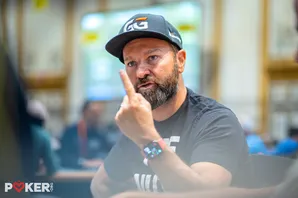The WSOP Main Event final table always throws up a lot of stories, but this year there’s been one that has dominated discussions above all others.
Usually an amateur player making a run all the way to the heads-up finale would be enough to grab headlines, but when that amateur then faces a longtime pro apparently receiving coaching advice and even solver access from their friends and backers on the rail, another conversation arises. What could have been a discussion about an exciting clash between two very different players has ended up a debate around rules, enforcement and ethics.
Jordan Griff was the amateur in the final two, and the event’s winner Jonathan Tamayo is the one accused of receiving potentially unethical coaching from fellow pros Joe McKeehen and Dominik Nitsche.
Griff joined Doug Polk on his podcast yesterday to give his perspective on the issue which has so powerfully captured the poker world’s attention. Click the video above to view the entire interview.
‘I don’t think that camp is looking to come out and be the good guy’
During the interview Griff does nothing to dent his public reputation: that of an enthusiastic everyman who managed to hold his own with some of the game’s biggest names, and came within a coinflip of winning it all.
Yet, like many, he sees the controversial behavior on his opponent’s rail as ultimately detrimental to the game, and much of it comes down to a frequently recurring theme in this debate: ‘optics’ and how it makes the game look to new and less experienced players.
“I’m sure there are some amateurs that see this and it’s intimidating,” Griff says, “We don’t always know what kind of edge a solver gives, you think you’re going to get heads-up and you’ll be playing against robots now. People don’t always know what’s going on with these solvers. It definitely makes the game harder.”
Then there’s the response from Dominik Nitsche, in particular, who has been vociferously unapologetic over the help he gave to Tamayo and the reactions it has provoked online.
“He [Nitsche] wants to play the villain, he’s got it. I don’t think that camp is looking to come out and be the good guy. I’m not speaking about Tamayo specifically, but I think that camp of people there, they’re happy with where they’re at. I think they’re maybe stirring the pot a little bit, but I don’t think their goal is to be in the public eye as the good guys or trying to be the best they can for the game.”
Could it be settled in court?
The debate has raised questions around ethics in the game, as well as whether there is any inherent responsibility on poker’s big winners and pros to be de facto ambassadors for the game. It’s also raised concerns about rule enforcement and consistency, given that the WSOP had previously made pre-tournament announcements that ‘poker solvers’ would not be allowed in the tournament area, and that ‘there’s a possibility of being disqualified’ should players be found using them.
The vague wording used in these warnings, as well as the lack of unambiguous rulings in the official 2024 WSOP rulebook, has led some to conclude that Tamayo and his team were simply pushing the boundaries as far as they were permitted to do so. If they were not stopped by tournament officials, the argument goes, then any fault lies with those officials and a lack of clear guidelines. It’s an argument Griff understands.
“I’m sure, in their mind if they knew they were doing something wrong they’re like ‘Oh, well, they’ll just tell us to put the laptop away’. I don’t think there were any serious repercussions that people thought would come out of that.”
With the tournament over and payouts made, it seems unlikely that the WSOP itself will revisit the events of the final table, though it’s easy to imagine an update to the rulebook for future series to address these particular concerns. Griff, however, has not ruled out any legal options that might be available to him if rules are found to have been breached.
“I would leave it open,” says Griff when asked about the possibility of heading down that path. “ I mean it's not like I would pursue it and be, like, ‘Wow, if they disqualify him I'm the Main Event Champion!’ - he won the heads-up battle whether he got assistance or not… It’s a lot to think about and I haven’t really looked into the laws, I haven’t spoken to anyone from a legal team.
“[Filing a suit] is always a possibility, but I’m not sure at this time.”



















